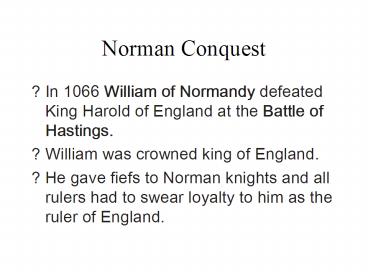Norman Conquest - PowerPoint PPT Presentation
1 / 16
Title:
Norman Conquest
Description:
In 1066 William of Normandy defeated King Harold of England at the Battle of Hastings. William was crowned king of England. ... England in Middle Ages ... – PowerPoint PPT presentation
Number of Views:4007
Avg rating:3.0/5.0
Title: Norman Conquest
1
Norman Conquest
- In 1066 William of Normandy defeated King Harold
of England at the Battle of Hastings. - William was crowned king of England.
- He gave fiefs to Norman knights and all rulers
had to swear loyalty to him as the ruler of
England.
2
England in Middle Ages
- The French-speaking Normans and the Anglo-Saxon
nobility gradually merged into a new English
culture. - William took the first census in western Europe
since Roman times, known as the Domesday Book. - He also developed the system of
- taxation and royal courts earlier Anglo-Saxon
kings had begun.
3
Henry II
- ruled from 1154 to 1189
- enlarged the power of the English monarchy
- He expanded the royal courts powers to cover
more criminal and property cases.
4
Henry II
- Applied a body of common law
- Henry claimed he had the right to punish the
clergy in royal courts - Thomas a Becket, archbishop of Canterbury,
disagreed. The angry king expressed his desire to
be rid of Becket. - Four knights took the challenge and killed the
archbishop in the cathedral. - An outraged public caused Henry to back off his
struggle with the Church.
5
King John
- Resenting the kings expanding power, many nobles
rebelled against King John. - In 1215, John was forced to agree to a document
of rights called the Magna Carta.
6
Magna Carta
- The Magna Carta recognized the longstanding
feudal idea of mutual rights and obligations
between lord and vassal. - Kings power was limited and not absolute.
7
Representative government
- In the thirteenth century during the reign of
Edward I, the English Parliament emerged - It granted taxes and passed laws.
- It was composed of two knights from each county,
two people from each town, and all of Englands
nobles and bishops.
8
House of Commons
- Later, nobles and church lords formed the House
of Lords, and knights and townspeople formed the
House of Commons. - These two houses still make up the British
Parliament.
9
French Kingdom
- The west Frankish lands formed the core of the
eventual kingdom of France. - The French monarchys power grew under King
Philip II Augustus. - Through making war Philip took back the French
territories of Normandy, Maine, Anjou, and
Aquitaine from the English. - He thereby greatly increased the income and power
of the French monarchy.
10
Philip The Fair
- Philip IV, also known as Philip the Fair, greatly
expanded the royal bureaucracy. - He also began the first French parliament,
- the Estates-General, by meeting with
representatives of the - three estates (classes)
11
French Estates
- Clergy (first estate)
- Nobles (second estate)
- Townspeople (third estate).
12
Holy Roman Empire
- the tenth century powerful Saxon dukes became
kings of the eastern Frankish kingdom. - The best-known was Otto I, who was crowned
emperor of the Romans by the pope in return for
protecting him.
13
Holy Roman Empire
- German kings tried to rule both German and
Italian lands. - Frederick I considered Italy the center of a
holy empire, hence the name Holy Roman Empire. - The struggle between popes and emperors had
profound effects on the Holy Roman Empire. - With the emperor gone to war, the German nobles
created many independent states.
14
Holy Roman Empire
- The German monarch could not maintain a strong
monarchy. Unlike England and France, neither
Italy nor Germany created a national monarchy in
the Middle Ages.
15
Development of Russia
- The Viking leader Oleg created the Rus
principality of Kiev in the tenth century. - Successors expanded Kiev until it included
territory between the Baltic and Black Seas and
the Danube and Volga Rivers - Civil wars and invasions brought an end to the
first Russian state of Kiev in 1169.
16
Mongol Invasion
- In the thirteenth century, Mongols conquered
Russia. - They occupied Russia and required Russian princes
to pay them tribute. - One powerful prince, Alexander Nevsky, defeated
an invading German army in 1242. - The leader of the western Mongols, rewarded
Nevsky with the title of grand-prince. - His descendents became princes of Moscow and then
leaders of all Russia.































